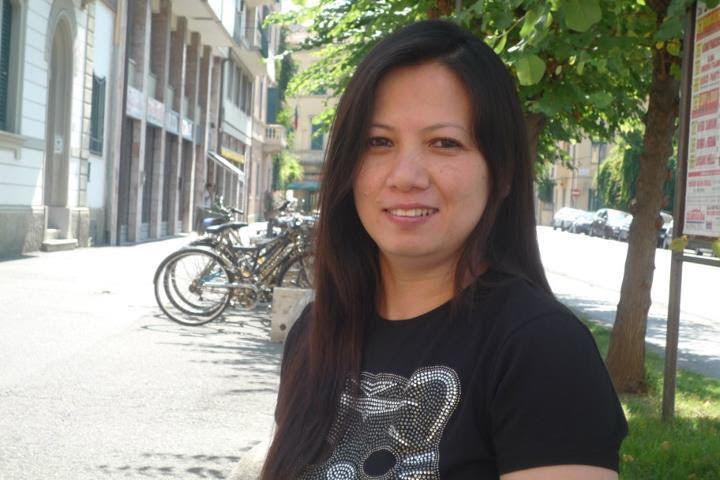Story and photos by BÜM D. TENORIO Jr.
“Grabe dito sa Pisa. It’s like [the] Apocalypse. We feel paranoid. May konting sumakit lamang sa katawan, feeling namin infected na rin kami. Fear is everywhere.”
The Filipino is an international race. We are everywhere.
In Pisa, Italy alone, some 300 people from Gulod, my barrio in Cabuyao, Laguna, now live and work in that part of the Tuscan region. There are so many of them there that visiting the central part of Pisa is like strolling into Gulod itself. The lilting barrio accent is present. The warm camaraderie exists.

The “Kamag-anak” system (extended family system) is so prevalent that when I was there in 2018, I was hosted breakfast, lunch and dinner by friends and relatives every day. Their lives are well-entrenched with the goings on in Gulod that whatever happens in our barrio is also amplified and celebrated in Pisa.
Recently, Pisa was a witness to a love in the time of coronavirus when Anne Katrina Lanaca, 19, a native of Gulod, who now lives and studies Linguistics in a university in Pisa, was visited by her boyfriend, Diego Geneciran, 22, from the same barrio, for almost two weeks, beginning the end of February.
Kat is my goddaughter. Diego, my godson and a graduating Marketing student, got to visit Kat because the trip was an advance birthday gift to him by his parents.
For some of their friends and relatives in Pisa, the romance between Kat and Diego was a welcome respite from the anxiety being caused by the COVID-19 pandemic around the world. That time, Pisa, which is in Tuscany, was still open, and with no confirmed cases of people infected with this coronavirus. (It was the region of Lombardi further north that was locked down because it was the epicenter of the virus in Italy.)
Through social media, their family and friends followed their whereabouts, as posted on Facebook. They gasped in glee every time the lovers went live on FB to chronicle their rendezvous in the beautiful landscape of the Tuscan region, with Diego’s cousin Glenn Aldueza in tow. For a while, their (the people of Gulod in Pisa) anxiety, brought about by the gripping effect of the virus, was put on hold.
When Diego and Glenn left Pisa on March 8 for Manila, many were still on a high with the romance Diego shared with Kat even for a short while. For them, every person from Gulod who visits Pisa represents the joys and longing they have for their beloved barrio.
On March 9, their lives took a sudden turn because the whole of Italy was placed under a lockdown. On March 11, the World Health Organization (WHO) declared COVID-19 a pandemic. Italy became the epicenter of coronavirus in Europe. As of March 31, records from the Italian government show that there are 101,739 confirmed cases of COVID-19 in Italy with 11,591 deaths and 14,620 recovered patients.
“All of a sudden, because of the lockdown, our lives changed,” says Kat. “And the normal get-togethers of friends and families in Pisa stopped because we need to be at home.”
Even the promenade area of the Leaning Tower of Pisa, says Em Em Lapidario, also my inaanak, is bereft of people. The only semblance of life is the green, green grass in the lawn and the momentary strong breeze that can hardly move the bell tower. “And of course there’s the polizia that patrol the ghost town.”

“Fear and loneliness cause our sleepless nights. Things have become uncertain,” adds Em Em, mother of a two-year-old boy named Z. She works as a babysitter to two Italian kids. Her employer is kind enough to allow her to go on leave during the one-month lockdown. She will get her salary in full despite not working for the duration of her quarantine.
“Grabe dito sa Pisa. It’s like [the] Apocalypse. We feel paranoid. May konting sumakit lamang sa katawan, feeling namin infected na rin kami. Fear is everywhere,” says Danly Lapidario, whose house in Gulod is next to ours and who now works in a money exchange company in the central train station of Pisa.

“When COVID-19 was first reported in Italy as early as February, many Asians were ostracized. One Filipino guy who looks Chinese got mugged. And many stayed away from Asians because Italians thought they were the carriers of the virus,” Kat adds.
Em Em provides her own observation on why cases of COVID-19 had spread wildly in Italy. “People here at first treated the virus like an ordinary flu. Many are used to being down with the ordinary flu, especially when the season changes. So even with the flu, they went on with their lives; the young ones continued to party. They did not know that it was already COVID-19 that they had,” she says.
“Contamination started when the people from the north (where Lombardi is located) started to go to Tuscany and Lazio, which is in central Italy; and the south (from Abbruzo to Sicilia all the way to Sardegna) to run away from the virus,” says Kat.
Echie Demejer, my childhood friend who has lived in Pisa more than she has stayed in Gulod, says the lockdown is supposed to end on April 4 “but it seems the lockdown will continue until June 4, according to authorities.”

“Or even up to July 31, if things are still worse,” adds Haydee Javier.
“So far, and thank God, no Filipino in Pisa has been infected by the virus. We are finding ways on how to help those who are affected by the lockdown,” adds Efren Mamplata, the president of the Gulod community in Pisa.

Evangeline Lanaca, mother of Kat, says, “We print our own permit (auto dichiarazione per gli spostamenti) and our trips are only limited to buying our food and groceries. If we do more than that, we will be apprehended by the police.”

A caregiver to an 83-year-old Italian woman, Evangeline got locked down in the house of her employer. She has not been home since. Her sentiments are also echoed by Arlene Lapinid Alviar who works in Rome. Arlene is also from Gulod.

“We are only allowed to go out to work and to buy what we need. There’s no hoarding and no food shortage. We line up at the supermarket or grocery store. We observe social distancing. The line is quite long, that it takes two-to-three hours to finish our grocery transaction,” Arlene says. She adds, “If one is caught loitering around, one gets fined 400 to 3,000 euros.”
“In Pisa, even if there’s no enforced curfew, if you are caught loitering around, you pay the fine of 400 to 3,000 euros. Plus the possibility of being jailed for three months,” says Hercy Carillo Pillas, 21. He used to work in a pizzeria.

“So far, the Filipino community follows the lockdown rule of not going out of the house unless it is necessary—to go to work (with work permit), or to buy supplies (also with quarantine pass),” says Haydee.
“The government gives 100 euros for one month to every household whose family members are affected by the lockdown. It’s given to those whose income is 12,000 euros or below,” Evangeline says.
“Mabuti na lamang walang isang kahig, isang tuka na Pinoy dito sa Pisa. Kung meron man, kahit paano ay may ayuda sa kanila ang gobyerno ng Italy,” says Danly. He adds that there are about 500 cases of COVID-19 in Pisa now. Thirty people (mostly over 70 years old) have died.
How they keep the fight
“We stay at home. We follow the rules. We don’t go out of the house. We wash our hands as often as possible. We also have alcohol and other kinds of disinfectant. We pray. We pray a lot. My children, even if there’s no school, they continue to study at home,” says Haydee.

Hercy says if it is necessary for any member of his family to go out of the house, he or she wears a mask and gloves. “And we eat healthy food, too.”
“We have never seen so many fruits on our table until COVID-19. We eat fruits every day to boost our immune system,” says Echie.
“Even if we are apart, I always make sure that Etok (my husband) and Yves (my son) who work every day are protected. I worry a lot about them,” says Evangeline. Etok works as a caregiver for a 100-year-old former military man. Yves works in a bodega of frozen and fresh food in Pisa.
With the lockdown in Rome, Arlene has more time to be with her nine-year-old daughter Angel. “I have time to help her in her schoolwork,” she says. And when loneliness strikes because of their inability to move around the city, she ruminates on her photo albums and thinks of the happier days she spent with her family back home.
Em Em’s partner, Rebo Opina, before he enters the house from work, peels off the three layers of his clothing. The first two layers are put in a plastic bag, straight to the laundry area. He enters the house with the last clothing layer. “Then he takes a bath. He sleeps in the other room. He hardly bonds with Z and me, that’s both our choice, to protect each other,” says Em Em.
“My family and I watch movies on TV or sing in the karaoke to while the time. We also do Zumba dancing. We have to keep active to keep sane,” says Echie.
“After the lockdown, I want to go home to the Philippines. I want to see my mother, my family,” Em Em adds.
Kat, the “princess” of the family, has discovered all the more that doing house chores will keep her sane and alive. It’s a good thing that she has Diego, her “prince,” who keeps her company albeit on video call.
Echie Demejer, Haydee Javier, Efren Mamplata, Em Em Lapidario, Danly Lapidario, Hercy Pillas, Kat Lanaca, Evangeline Lanaca and Arlene Alviar are hopeful that better and safer days are coming to Italy. They hope those days will come soon. But while they wait, they try to hold on to their faith.





